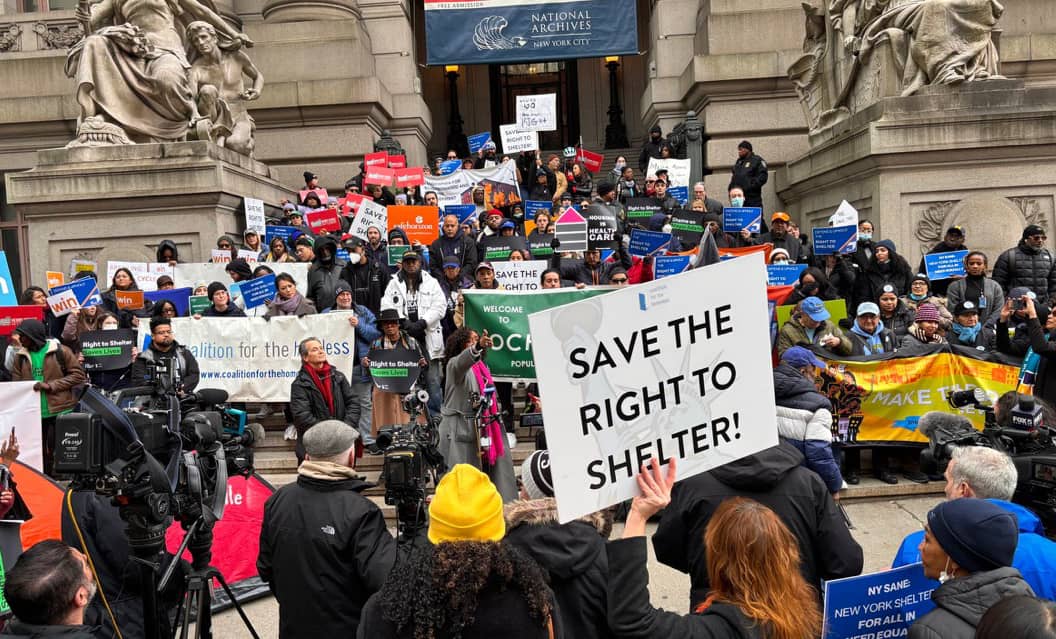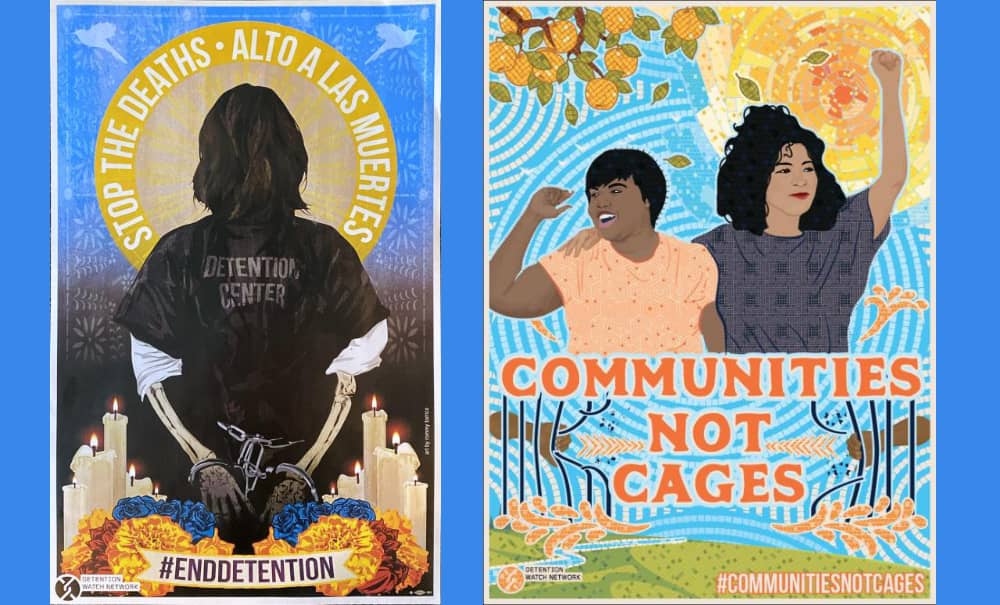
Dear friends,
We spend time at each JHISN meeting discussing what topics to write about in our next newsletter—the work of local immigrant justice groups? Immigrant organizing and struggles at the state or national level? This week we decided to pull together a longer article around what is happening with the influx of new migrants–an estimated 210,000–who have arrived in New York City since spring 2022. We realized that if we were not sure what was happening, maybe you, our readers, would value an update, too. And we continue to ask ourselves, and you too, what can solidarity look like with tens of thousands of new New Yorkers trying to rebuild their lives in the face of extraordinary challenges?
1. Update on Migrant Politics in NYC
The flow of migrants to NY has slowed because of President Biden’s stringent restrictions on asylum seekers. But politics in the city is still roiled by disputes over how to care for the 64,000 migrant children and adults enmeshed in a makeshift, underfunded emergency shelter system, and the tens of thousands more pushed out of the shelters, who are struggling with homelessness, bureaucracy, inadequate services, and lack of solidarity. While the Adams administration works to erode the Right to Shelter, imposing cruel new time limits for shelter stays and disrupting asylum seekers’ attempts to form survival communities, advocates are warning officials in NYC and Albany about immigrants’ dire precarity and loss of human rights.
In early 2024, NYC began—for the first time since historic Right to Shelter policies were put in place—to enforce 30-day eviction notices for single migrant adults, and 60-day eviction notices for some recently arrived migrant families sheltering in the city’s emergency housing system. But evictions were spared for all migrants staying in over 160 Department of Homeless Services (DHS) shelters, located largely in Manhattan and Queens and housing just over half of recent migrants.
That all changed this past month when New York State gave the green light for the city to begin issuing 60-day eviction notices to any migrant family in DHS shelters except for those registered for public assistance, or who have successfully applied for asylum or Temporary Protective Status (TPS). Thousands of recent arrivals, including school-age children, are now threatened with displacement by the new emergency shelter policy (which does not affect non-migrant adults or families).
In August the city also began conducting sweeps to take down migrant encampments that had grown up beneath an overpass in Brooklyn, and next to shelters from which people had been evicted, including outside the 3,000 person mega-shelter on Randall’s Island. Some people set up tents at dusk and take them down in the morning, others sleep in the open under blankets. These newly established communities feel cooperative and safer, according to participants; people pool their money to buy food that they share. A statement by the Legal Aid Society and the Coalition for the Homeless criticized destruction of the encampments, saying: “These continued sweeps are cruel, confusing, and have a chilling effect on our clients and their willingness to seek City services to which they are entitled.”
The experience of recently arrived children is especially dire. The new DHS shelter evictions mean many school-age children are forced to change schools—losing friends, teachers, and any sense of steady community. Nearly 40,000 new migrant children have enrolled in NYC public schools since 2022. But far from declaring an emergency, NYC schools chancellor David C. Banks recently noted that the influx of new students “has been a godsend” for some schools, making up for recent dramatic enrollment declines and helping some schools to keep their doors open. “If you want to see New York City schools at their best,” Banks says, “look at how these teachers have responded to the migrant crisis. It’s incredible. They’ve partnered kids with other kids who are serving as buddies for them. They’ve got mentors from older grades.” With shelter evictions now on the table, some schools risk a sudden, mid-year loss of enrollment which threatens budgeting and teacher placement, along with the severe disruption to children’s lives and learning.
Evictions also introduce a Kafkaesque element to migrants’ struggles to gain work authorization, or pursue their legal cases for asylum and legal status: the cascading effects of lost or undelivered mail. With tens of thousands of newly arrived migrants staying in over 200 emergency shelters throughout the city, the makeshift mail rooms in shelter spaces are simply unable to effectively handle the flow of mail. Documents to apply for work authorization or Social Security numbers, notices to appear in immigration court—all move through the mail system and must be delivered and received on time. Shelter evictions have only intensified the problem. Migrants trying to retrieve mail from shelters they have been forced out of are often prohibited from re-entry, or told that they have no mail even when they have delivery receipts.
The wave of ongoing migrant evictions has not taken place without challenge. Brooklyn Council Member Shahana Hanif has sponsored a bill that would prohibit any city agency from limiting length of stay for anyone in city shelters or emergency housing. At the NY state level, similar legislation has been introduced.
NYC comptroller Brad Lander conducted an investigation into the 60-day Rule, concluding in May 2024 that the policy has been implemented haphazardly, and should end. Instead, the city should “implement a policy that genuinely coordinates temporary shelter, legal assistance toward immigration status and work authorization, workforce development that enables people to obtain work, and case management that enables people to achieve self-sufficiency.”
Activist groups joined together statewide over a year ago to form the NY SANE Coalition to protect the legal Right to Shelter—including Housing Justice For All, the Legal Aid Society, Coalition for the Homeless, and Win. They too have demanded the elimination of new shelter limits for asylum seekers, and an end to “this cruel practice that will leave families in the cold and uproot children from their classrooms.” A letter in May 2024 from health care workers to the mayor and the governor stated clearly: “We are reminded daily in our practice that stable shelter is absolutely necessary for human health and life….Over the past two years, we’ve seen firsthand how a lack of stable housing for migrants and unhoused New Yorkers has contributed to their systemic exclusion from life-saving healthcare…”
The Adams administration seems locked onto a policy of punitive, inhumane measures to discourage migrants from coming to NYC, or from succeeding if they make it here. What they have actually accomplished is making the city worse for all of us: generating unnecessary trauma, homelessness, and conflict. This is the wrong path. With some creativity and compassion, the current wave of immigrants could quickly become part of our communities and our workforces, invigorating and strengthening our city, as wave after wave of migrants has done before. New York should welcome our new neighbors and invest in their future—our future—instead of criminalizing and obstructing them.
WHAT CAN WE DO?
- Follow NY SANE Coalition and their fight to roll back the Mayor’s shelter eviction policy.
- Keep the pressure on our local Council Member, Shekar Krishnan, to help win passage of Int. No. 210, the bill to protect migrants from shelter eviction.
In solidarity and with collective care,
Jackson Heights Immigrant Solidarity Network (JHISN)
Follow @JHSolidarity on Facebook and Twitter and share this newsletter with friends, families, neighbors, networks, and colleagues so they can subscribe and receive news from JHISN.




